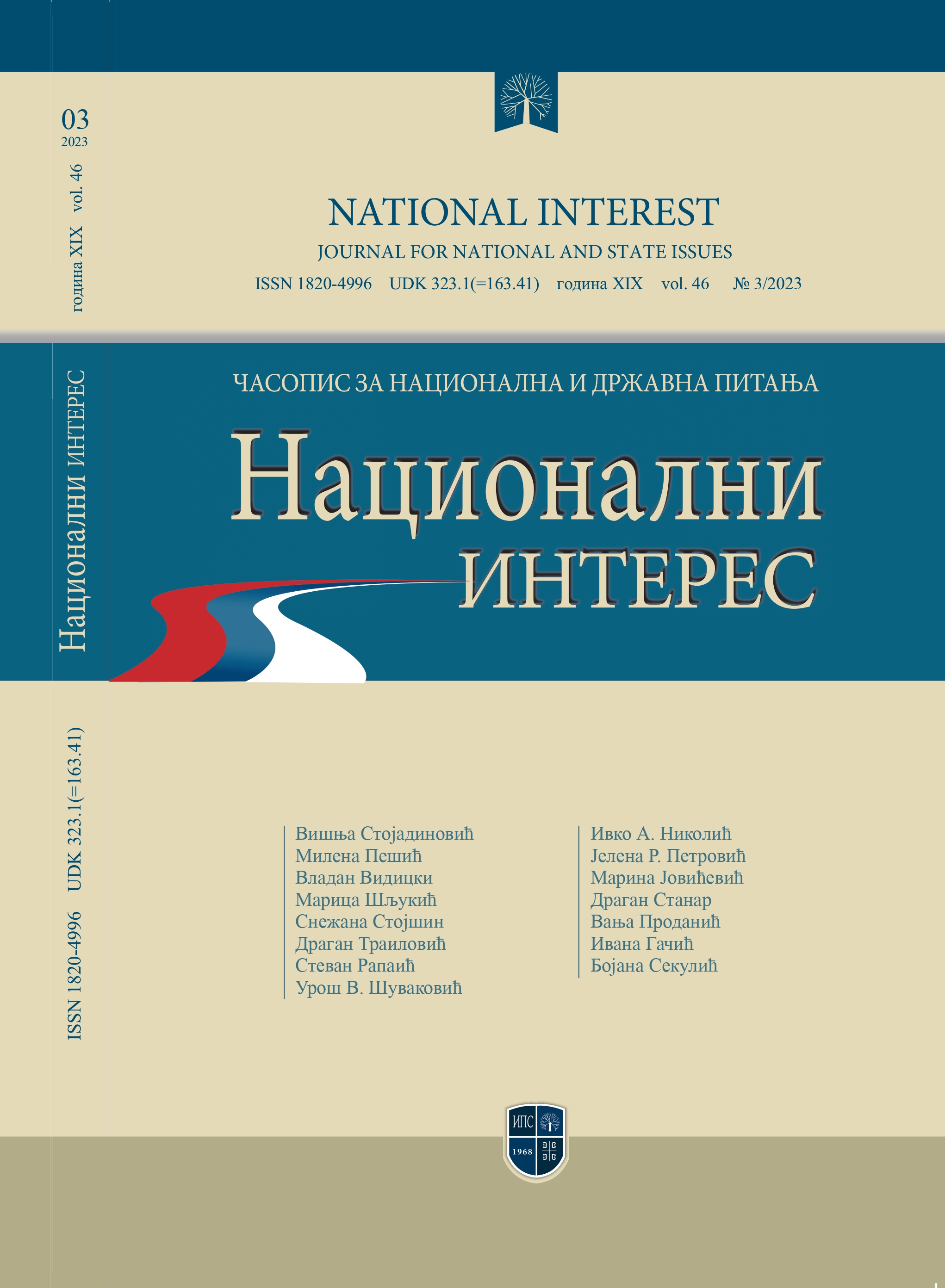„TRESHOLD OF MEANING“ AND „CEILING OF FORM“ IN THE CONTEMPORARY MILITARY
Abstract
In this paper author wishes to explore and investigate the relationship between form and meaning in contemporary militaries, aiming to identify the phenomena of form not reaching the threshold of meaning and form which breaks its own ceiling. Relying on methods of conceptual analysis, comparative analysis, content analysis, deduction and other scientific methods, the author identifies the problematic phenomena of form not meeting the threshold of meaning and form which breaks its own ceiling. These are the cases of misunderstanding, or even deliberate ignoring, of the value nature of form, which is always and by definition in the realm of instrumental, and even postulating form as an intrinsic value, a value in itself. When form has no contribution to achieving a goal of intrinsic and “final” value, then it cannot be observed as valuable, and as such it loses its existential justification. Moreover, in cases in which form becomes observed as intrinsic value, i.e., not an instrument and means of achieving some final value, but rather a value in itself, it breaks its own proverbial ceiling. Both these cases are hindering, even detrimental, to achieving the final goal on the basis of which they were even created in the first place. The author first explains why form is of such crucial value for the military, as it is extremely complex and “unnatural,” observing several aspects of the military which demand the existence of strict and robust form in order for the system to properly function. Upon explaining its significance, the author identifies specific articulations of form – previously elaborated phenomena of form aren't reaching the threshold of meaning and for breaking its own ceiling – which are detrimental to the military. The author argues that such articulations of form are not in military systems. At the same time, that they are extremely dangerous and detrimental for optimal functioning of the military. In conclusion of the paper, the author asserts that certain measures must be implemented in military systems. They must evaluate and re-evaluate all existing articulations of form to identify and eliminate those which have no justification for existence. Such evaluation must be undone in an ad hoc fashion, but rather a process of constant evaluation of form must be integrated into the military organization to yield optimal results.
References
Аристотел. 2007. Метафизика. Београд: Паидеиа.
Бабић, Јован. 2023. Природно, нормално, исправно. Београд: Службени гласник.
Кајтез, Илија. 2021. „Филозофско поимање државне власти (друштвене моћи) и војске (оружане силе)”. Војно дело (3): 9-20. doi: 10.5937/vojdelo2103009K.
Макијавели, Николо. 2005. Владалац. Београд: Дерета.
Милојевић, Велибор. 1999. Морал војске. Београд: ВИЗ.
Станар, Драган. 2019а. „Демократија, стручност и лојалност: систем плена или олигархија експерата”. Зборник Матице српске за друштвене науке 172 (4): 551-561. doi:10.2298/ZMSDN1972551S.
Станар, Драган. 2019б. „Професија и морал”. Култура полиса 16 (39): 145-157.
Станар, Драган. 2021. „Мир као сврха војске”. Војно дело (3): 36-47. doi: 10.5937/vojdelo2103036S.
Станар, Драган. 2022. „Политичка победа у рату: оружане снаге и синдром ‘изгубљене победе’”. Српска политичка мисао 77 (3): 119-135. doi: 10.22182/spm.7732022.6.
Старчевић, Срђан. 2010. „Преторијански проблем у савременој политикологији”. Војно дело (4): 193-209.
Старчевић, Срђан, и Срђан Благојевић. 2017. „Кревелдов спор са Клаузевицем – да ли је смисао рата -политички?”. Српска политичка мисао 56 (2): 117-134. doi: 10.22182/spm.5622017.7.
Baker, Deane-Peter. 2011. Just Warriors Inc.: The Ethics of Privatized Force. London/New York: Continuum.
Cekić, Nenad. 2013. Metaetika. Beograd: Akademska knjiga.
Collins, Jeffrey, and Andrew Futter. (2015). Reassessing the Revolution in Military Affairs: Transformation, Evolution and Lessons Learnt. London: Palgrave MacMillan.
Hantington, Semjuel P. 2004. Vojnik i država: teorija i politika civilno-vojnih odnosa. Beograd: CSJE, Fakultet političkih nauka i Diplomatska akademija.
Hobsbaum, Erik. 2008. Globalizacija, demokratija i terorizam. Beograd: Arhipelag.
McMahan, Jeff. 2009. Killing in War. Oxford: Clarendon Press.
Moore, George Edward. 1959. Philosophical Papers. Sydney: George Allen & Unwin LTD.
Pinker, Steven. 2018. Enlightenment Now: The Case for Reason, Science, Humanism, and Progress. New York: Viking.
Ronnow-Rasmussen, Toni. (2002). “Instrumental Values: Strong and Weak”. Ethical Theory and Moral Practice 5 (1): 23-43. doi: 10.1023/A:1014422001048.
Stanar, Dragan. 2021. “The Vital Significance of Military Ethics”. Journal of Military Ethics 20 (3-4): 237-250. doi: 10.1080/15027570.2021.2011913.
Starčević, Srđan, and Dragan Stanar. 2022. „Society of right claiming and transformation of war and military at the end of the 20th and beginning of the 21st century.” In Human Rights Protection Yearbook: From childhood to the right to a dignified old age – human rights and institutions, ed. Zoran Pavlović, 153-167. Nоvi Sаd: Provincial Protector of Citizens – Ombudsman and Institute of Criminological and Sociological Research in Belgrade.
Volzer, Majkl. 2010. Pravedni i nepravedni ratovi. Beograd: Službeni glasnik.
Wertheimer, Roger. 2010. “The Morality Of Military Ethics Education”. In Empowering Our military Conscience, ed. Roger Wertheimer, 245-299. London: Routledge.

